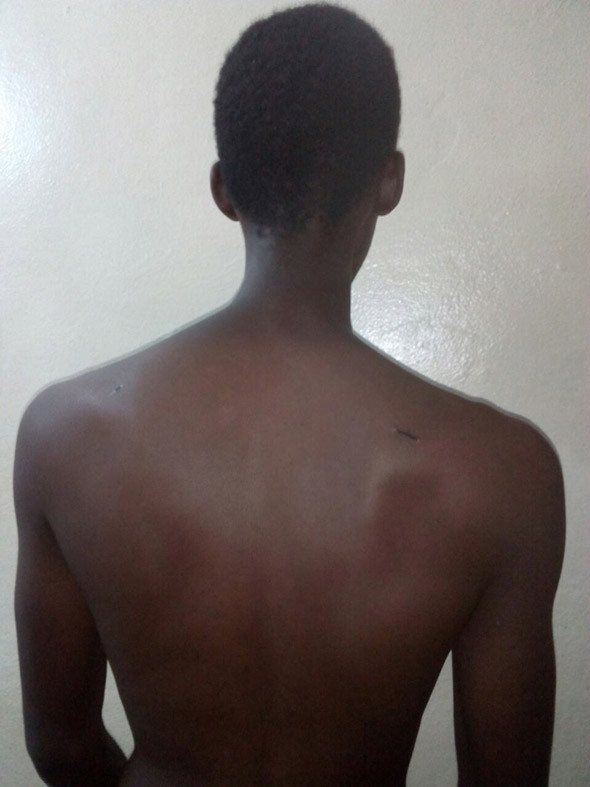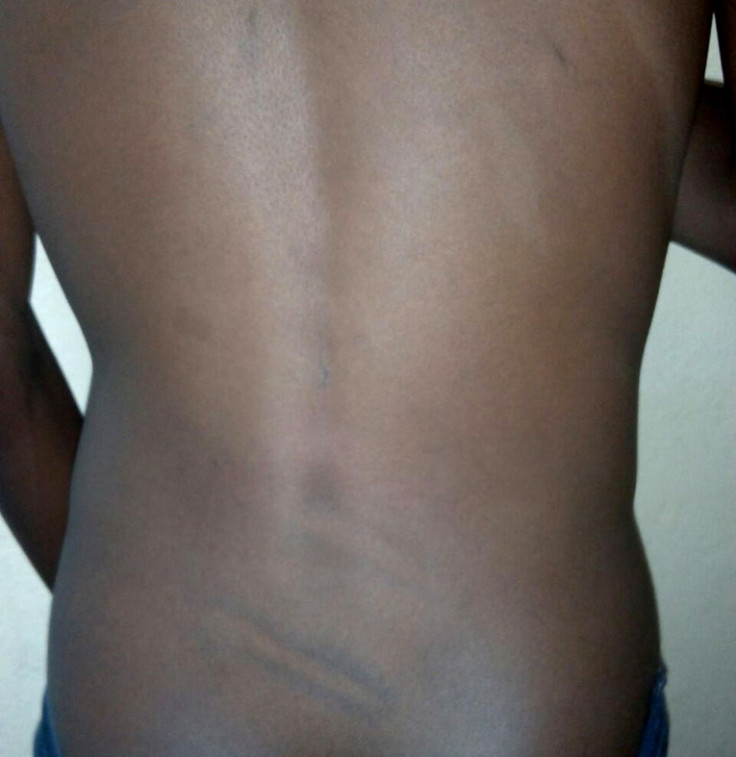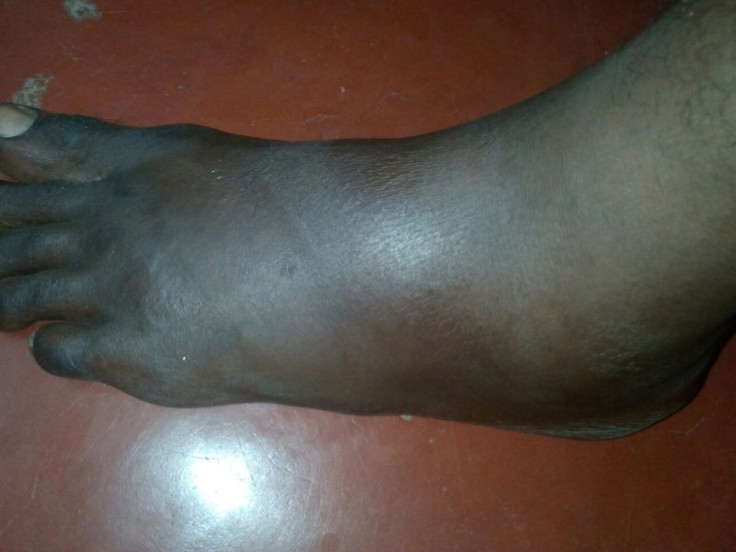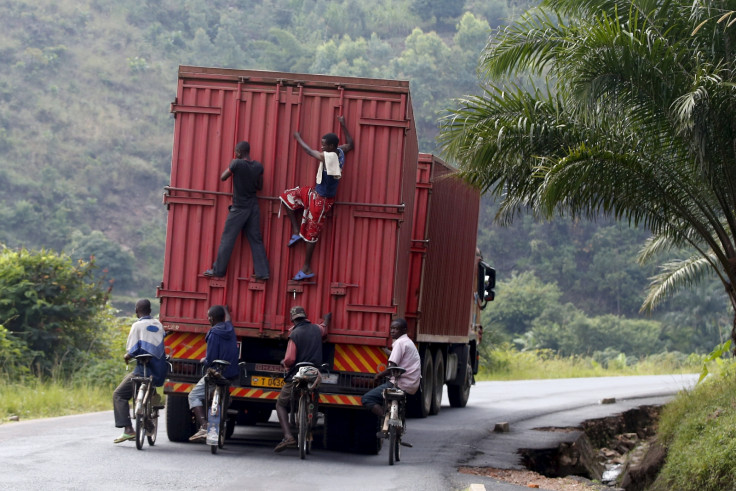Burundi: Police tortured me with tear gas until I choked, says protester

Less than a week after being tortured by the Burundian police, Dieudonné is already looking to flee to Rwanda, which he says is the only place where he will feel safe.
Burundi President Pierre Nkurunziza has been consolidating his position in the aftermath of a failed coup attempt on 13 May by carrying out a relentless crackdown on dissidents and enforcing a virtual ban on protests.
Demonstrations started in the Eastern African nation when Nkurunziza declared his intention to stand for a third term in the upcoming 15 July elections, which the opposition claims is unconstitutional. However, his supporters argue that the president's first term should be discounted as it was chosen by the Parliament.
That day there weren't even any protest in the street, yet they stopped me. Then they arrested me and asked to see my phone.
Dieudonné, who had participated in only a few marches, was heading to the Nyakabiga district, an anti-third term protest hotspot in the capital Bujumbura, when he says he saw around 10 policemen on Tuesday 2 June.
"They asked me where I lived and where I was going. That day there weren't even any protests in the street, yet they stopped me. Then they arrested me and asked to see my phone."
As officers went through his mobile, Dieudonné says police believe they found pictures of the protests and messages in which Dieudonné and his contacts may have mentioned the third mandate.
"Then they handcuffed me, without even telling me what they found on my phone that was so incriminating. I know there was nothing much on my phone, but when you have WhatsApp, people can send you pictures. I hadn't even taken the pictures that were on my phone," the young man, whose real identity has been withheld, told IBTimes UK from his home in Bujumbura.
After officers arrested the 20-year-old and called a pickup truck, police started accusing Dieudonné of being a leader of the Nyakadiga protests.
"I told them I didn't even live in Nyakabiga but they still took me," he recalled.
The torture ground

Carrying a dozen policemen, the vehicle stopped in Bujumbura Mairie Province near the capital's Old East building, where once stood a presidential palace locally dubbed Ndadaye - after the country's first democratically elected President Melchior Ndadaye.
"This is the place where, when someone is arrested, he is taken to be tortured. Every protester found in the street is tortured there," Dieudonné said.
I was brought to the place where, when someone is arrested, he is taken to be tortured. Every protester found in the street is tortured there
Along with two others – including a 15 year-old minor – he claims he was brought to a field by brute force, where between 30 and 40 policemen were waiting.
"Where they took me was very far from the main road. No one could see what was happening. That was the goal: no one should know what was happening, far from the media, behind closed doors."
When he arrived on the deserted piece of land, Dieudonné said he immediately recognised a man known locally as "Kazungu". According to local journalists, civil society leaders and human rights activists, the man, whose real name is Joseph Niyonzima, is an officer from the secret services, known for allegedly carrying out acts of torture.
"I only saw him when I arrived on the field after getting out of the car, and at that moment I really thought I was going to die, because of the stories I have heard about him," Dieudonné said, adding Kazungu accused him of being a ring leader.
Officers then emptied the young man's pockets, and took Dieudonné's sunglasses and 3000 Burundian francs (£1.25) before asking him to remove his shoes – which the young man claims the police never handed back.
"They took everything from me, and ordered me to lie down on the ground. I was scared. I could see they had bayonets. An officer hit my back with his rifle," Dieudonné recalled.
"They hit, and punched and hit before taking us to a sort of shed where they put us on the ground before opening tear gas canisters and lighting them. They started putting it above my head, to torture me. I couldn't breathe and my vision started to blur because of the gas. I was choking."

'We were called terrorrists'
The whole time, the young man says, officers insulted him and the other two detainees. "They were calling my mother names in Kirundi, they were calling us terrorists, accused us of killing cops during the protests.
More than 40 civilians have died in clashes with pro-government forces, including a number of police officers. In one incident, on 12 May, a female police officer was stoned and dragged through the streets of Burundian capital for allegedly being part of a group officers that opened fire on a crowd with live ammunition.
"They said I was one of the leaders of the protests – but I'm not one. I'm just an ordinary citizen," said Dieudonné.
Police officers hit me with branches, with their night sticks and with their rifles. That hurt the most; my back was injured. The whole time we were begging, pleading them to stop.
Still shaken, Dieudonné recalls how an officer, as he was beating him, made "strange comments" about the young man "never becoming a president even if I continued with the protests".
"They hit me with branches, with their night sticks and with their rifles. That hurt the most; my back was injured. The whole time we were begging, pleading them to stop."
While the young man says the majority of officers present continued to hurt him, one of them stood out from the crowd by asking others to stop.
"He was against what they were doing to us. He was asking others to stop torturing us. He told them they were going to kill us if they continued. But that's precisely what the others wanted to do: kill us. They even said so themselves, they told us: 'We are going to kill you like you killed our officers'."
In the young man's view, the ordeal, which lasted "45 minutes, without respite", felt more like a vengeance than a police interrogation.

'Why are you bringing cadavers here?'
After the torment, the three detainees were brought to a communal cell with three other men, at the judicial police prison in Bujumbura, where Dieudonné spent the next day and a half.
"We couldn't walk when we got there, because of the beatings. When we arrived at the prison, one of the judicial police officers asked one of our assailants: 'Why are you bringing cadavers here?'. At that point I realised we had been spared."
The young man believes the fact that local media were alerted about his arrest saved his life.
"They released me because they realised everyone (Iwacu, Voix d'Amerique and Renaissance TV) knew about this arbitrary arrest. An inhabitant from Nykadiga must have called them when I got arrested. And police got scared about the reach my disappearance could have."
I am too scared the police will go after me again for speaking, so I can no longer stay in my house. I will leave for Rwanda, where I know I will be safe again.
Once in prison, Dieudonné says he was not tortured - but rather questioned about what had happened that day.
"We were only asked why we had been arrested and what the other officers had done to us," said the young man, who claims that between 10am on Tuesday until 6pm on Wednesday when he was released, he was only fed once.
The men did not receive any medical treatment while they were incarcerated, Dieudonné also affirms. The only medical help, however, came from fellow prisoners – incarcerated for other crimes - with whom he shared the cell. The detainees helped soothe broken bodies by massaging them with ointment.
Finally, Dieudonné's mother came to collect him from prison before he could head home. The young man could barely walk.
"My legs are still hurting even though the worst is behind," he said on Monday (8 June).
Since returning from hospital, where he spent Friday (5 June) to undergo medical checks, Dieudonné says he has been planning his escape out of Bujumbura, and then out of Burundi.
"I am too scared the police will go after me again for speaking, so I can no longer stay in my house. I will leave for Rwanda, where I know I will be safe again."

© Copyright IBTimes 2025. All rights reserved.






















